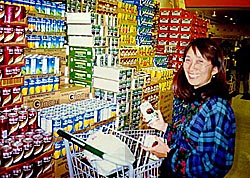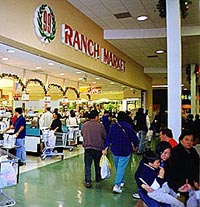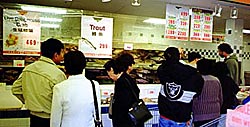Grass
Jelly, Anyone? 99 Ranch Brings Asian Flavor to East Bay
by
STACY SCHWANDT
![]() LINDA
LIEN, A SECOND GENERATION CHINESE AMERICAN, stood in the supermarket aisle
examining canned drinks. Her cart was packed with pasta sauce, chicken
noodle soup, and cookies, but the drinks were Taisun's Grass Jelly Drink,
a product of Taiwan. The cans show a wide goblet full of chunky purplish
liquid. The ingredients read: water, sugar, and pectin. "I thought
I might try this jelly drink," she said. "I am trying to stock
up a bit for Y2K, and it's kind of sweet. It might be fun to have if anything
goes wrong."
LINDA
LIEN, A SECOND GENERATION CHINESE AMERICAN, stood in the supermarket aisle
examining canned drinks. Her cart was packed with pasta sauce, chicken
noodle soup, and cookies, but the drinks were Taisun's Grass Jelly Drink,
a product of Taiwan. The cans show a wide goblet full of chunky purplish
liquid. The ingredients read: water, sugar, and pectin. "I thought
I might try this jelly drink," she said. "I am trying to stock
up a bit for Y2K, and it's kind of sweet. It might be fun to have if anything
goes wrong."
 |
On the other side of Richmond's 99 Ranch Market, Taisheng
Liou guzzled pearl tea, a milky iced tea with dark balls of tapioca rolling
at the bottom, which is also from Taiwan. "The tapioca is chewy,"
he said as he sucked some up through his wide, red straw. "Like soft
candy." Liou came to the United States from Taiwan in 1993 to get
a Ph.D. in civil engineering from the University of California at Berkeley.
"This is a snack drink in Taiwan," he said. He recalled drinking
the pearl tea as a child. "I started seeing it around here about
2 or 3 years ago, right about when this market opened."
99 Ranch Market is a Los
Angeles-based supermarket chain specializing in Asian grocery products
with six stores in the Bay Area and 21 across the country. Their 35,000
square foot Richmond store opened in 1998 inside the Pacific East Mall,
an Asian-themed shopping center located just off I-80 on the Richmond
side of San Pablo Avenue.
"When Roger Chen
[99 Ranch Market founder] first started the business in 1984, he created
it for Asian customers who had to drive over an hour into the Chinatowns
to buy groceries," said Tony Chen, senior vice president of 99 Ranch
Market, who is not related to Roger Chen. Behind this idea, Tony Chen
notes, was the growing affluence in the Asian American community that
enabled many people to move from their urban neighborhoods to the suburbs.
"He thought he would create an Asian-themed supermarket so they could
have their home-town taste nearby," Chen said.
|
One entire side of aisle four
is lined with assorted brands of rice stick, noodles, and bean thread.
Shoppers can choose persimmons or Japanese eggplant from the produce
section. Meat eaters can buy oxtail, cow brains, or entire roasted
duck.
|
 |
Many 99 Ranch Market customers said
they shop occasionally in Chinatown markets, but all agree that the Richmond
store offers an attractive alternative. "All the selection is here,
and the price isn't bad," said Delia Causatin, a 45-year-old native
of the Philippines who's lived in Oakland since 1978 and now works at
Kaiser in Berkeley. Indeed, the selection at Ranch 99 is vast. One entire
side of aisle four is lined with assorted brands of rice stick, noodles,
and bean thread. Shoppers can choose persimmons or Japanese eggplant from
the produce section. Meat eaters can buy oxtail, cow brains, or entire
roasted duck. Shoppers can even find Tabasco sauce in aisle six. "In
Chinatown you have to go to more than one place, and often the shops are
dirty," Causatin said. "This store is so modern and convenient.
I can even use my ATM card."
Akemi Uchima, a Japanese
immigrant living in El Sobrante, squinted at the shelves. "I'm looking
for sour plum," she said. "You can put it in a rice ball and
eat it for lunch. It's good for your stomach." Like many in the market,
Uchima cites good selection as one of her primary reasons for shopping
at the 99 Ranch Market, but she will still go to San Francisco's Japantown
if she can't find the sour plum. "I teach Japanese at USF,"
she said. "So it's not too far." According to some customers,
the market has become a meeting place and central component of their community
life. "I run into all my Chinese friends and family here," said
Richmond resident Helen Wang, a native of Hong Kong. "I like it here
because this place is really international. My father was in the navy
and we traveled a lot when I was young. I speak 12 languages, and this
place really feels like home."
In fact, the owners of 99 Ranch market are proud of their diversity. "I
guess some people think that it is a Chinese place," said Eugene
Yeh, 99 Ranch's assistant manager. "But once they get here, the realize
it's not." 99 Ranch has 143 employees. Two are Asian American who
can only speak English. Seventy employees speak both English and Chinese.
Thirty-six can also speak Spanish. Eighteen speak Vietnamese and 11 speak
languages native to Thailand or Laos. Three are from the Philippines,
two are from India, and one employee is from Korea.
In early 1999, one year
after the Pacific East Mall opened, a similar Asian-themed shopping center,
the International Market, was built further north in San Pablo. This newest
shopping center is anchored by a Lion grocery store, a Thai-operated business
similar to 99 Ranch. The Asian community in the East Bay is growing, but
the competition still presents a challenge for the 99 Ranch owners.
 |
According to a 1999 report released
by the State of California's Department of Finance, the Asian population
is growing faster in the East Bay than in San Francisco. From 1990 to
1997, there was a 2.5 percent increase in the number of Asian residents
in San Francisco, whereas Contra Costa County's Asian community grew by
3.5 percent and Alameda's by nearly four percent.
"There are a lot
of Asians in this area. Sometimes it is called little Taipei," said
Terry Kwong, the developer who owns Pacific East Mall. "And our customers
are different from the ones who shop at the International Market."
But Ranch Market's Tony Chen realizes that the competition will affect
business. "Eventually the market is going to be saturated,"
he said. "We have to concentrate on improving our stores and customer
services."
Eugene Yeh described one
of 99 Ranch Market's strategies. "We are trying to broaden our appeal
to the western customers," he said. Yeh estimates that currently
30 percent of the families who shop at the market are not Asian. "They
like this style, the face to face service," he said. "Especially
in the fresh fish department." A fish counter spans the back wall
of the supermarket with over 20 varieties of fresh fish. There are four
large tanks stacked in the left corner, two filled with scrambling crabs
and two packed with spotted trout. Signs hung from the ceiling describe
the services the fish mongers offer: Clean only. Clean and remove head.
Cut into steaks. Fry.
"Some of the customers
ask us questions about how to cook this or how to make this taste better,"
Yeh said. "We can give them a suggestion, and exchange our experiences.
Sometimes they just look at the cooking program on the TV and they will
take the information down and ask us how to cook it. We will tell them,
buy this and this. And they will give it a try." Chen said that they
are considering sponsoring cooking demonstrations at the market.
Cathy Carlon of Benecia
said that sounded interesting. "I'm here with my friend Futuski,"
she said. "She comes to buy ingredients for sushi. I'm just buying
little candies and fruit gels for my daughter to take back to college.
It would be cool to learn something new about Asian cuisine."